A Kino Lorber miscellany
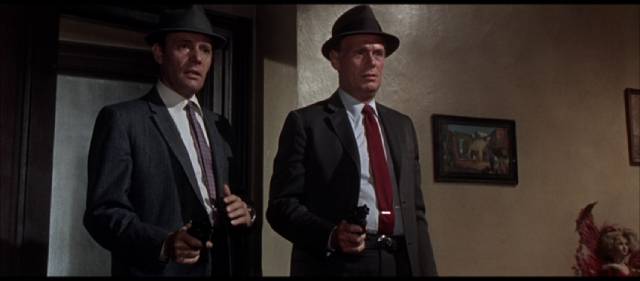
in Don Siegel’s Madigan (1968)
It’s hard to believe that it’s been seven months since I had my shoulder surgery. Seven months since I was last at my day job. But now the end of my “medical vacation” is finally looming. It’s going to be tough to return to a regular work routine – shifting my schedule back to a much earlier start to the day. It’s also going to impact this blog. My relationship to the website has changed over these months of recovery. My old habit was to write the weekly post in a few hours on Sunday morning, editing and formatting in a couple of brief sessions over the following two days after work so that the post was ready by Wednesday. With my time free, though, I’ve taken to writing almost every day. On average, the posts have grown longer and sometimes I take three or four days to write a single post. It won’t be possible to maintain that kind of routine once I’m working again. With less time available, and a more concrete deadline every week, I’ll have to be more disciplined and concise. I’m already feeling stressed about it!
*
Perhaps in unconscious anticipation of this change, I went overboard back in December, taking advantage of several online sales to stock up on far more disks than I need. One of these sales was for Kino Lorber releases. KL is a really prolific company, but their prices are usually a bit high, discouraging me even when I’m attracted to particular titles. At 40% off, though, I lost control … and in the past few weeks, I’ve been working through the pile. Some of these are upgrades from earlier DVD editions, some new acquisitions; some movies I’ve been looking for for a while, others I hadn’t previously heard of. Here I’ll make a few brief comments about a handful of them.
*
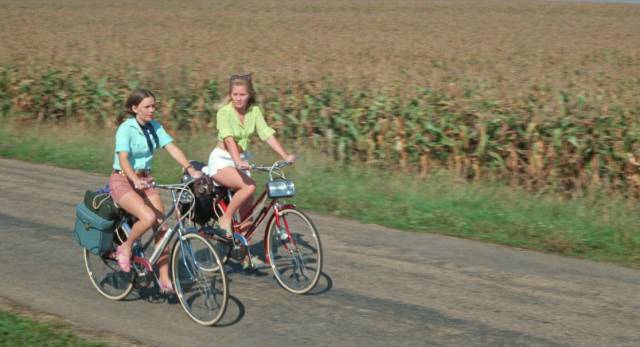
in Robert Fuest’s And Soon the Darkness (1970)
And Soon the Darkness (Robert Fuest, 1970)
Robert Fuest was a television director who, in the first half of the 1970s, suddenly made a string of stylish genre movies, several of which became fan favourites (he had made one previous feature, a comedy called Just Like a Woman, in 1967). These included the two Dr. Phibes films (1971, 1972), the Michael Moorcock adaptation The Final Programme (1973) and the somewhat wacky The Devil’s Rain (1975). While these all have their interesting qualities and entertainment value, his best feature was the one which started the run – And Soon the Darkness (1970).
Co-written by the prolific Brian Clemens (he created and/or wrote for numerous iconic British series and occasional Hammer productions) and Terry Nation (creator of Doctor Who’s Daleks [1963] and the apocalyptic Survivors [1975-77]), the film plays very effectively with familiar genre elements – two young English nurses on a cycling tour of rural France run into a local serial killer – but freshens them by situating the menace not in dark woods but rather a wide open landscape baking under the sun in a clear blue sky.
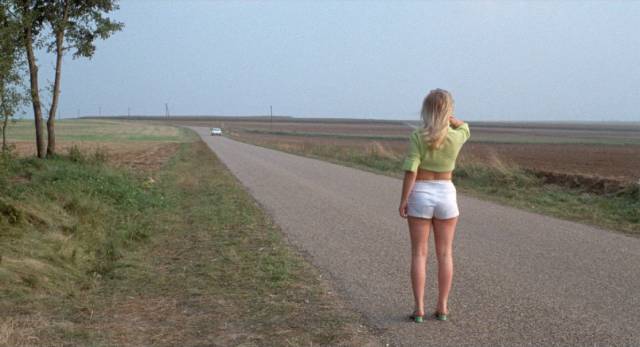
Early in their trip, Jane (Pamela Franklin) and Cathy (Michele Dotrice) are already getting on each other’s nerves. Jane is all about putting in the miles, cycling from one village to the next, while Cathy is bored, wanting to meet people and party – which is unlikely in this rural area. After an argument, Cathy refuses to go any further, lying down in the sun by a small patch of woods. Jane leaves her there, stopping at a cafe in the next village to wait for a contrite Cathy to catch up with her.
After a while, becoming concerned, Jane rides back. Cathy is no longer there. So she rides back to the previous village to see if Cathy had gone back the way they came. But no one has seen her. Increasingly worried, Jane seeks the help of the local gendarme. Unfolding in something like real time, the story manages to build suspense while maintaining a languid pace and tranquil, sunny surface. Jane’s fears are heightened by the difficulty of speaking to the locals – her French is rudimentary, their English mostly non-existent. The tension is increased by the fact that none of the French dialogue is subtitled, so the audience is put in the same position as Jane.
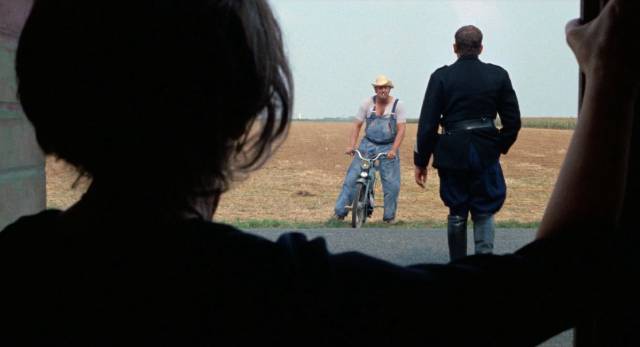
If the film has one weakness, it’s that the main red herring is somewhat overplayed; a French character who seems to be helpful, but increasingly behaves in suspicious ways, is drawn a bit too broadly. But for the most part, performances are fine and Fuest sustains the feeling of vulnerability which comes with being in a strange place where a language barrier makes it difficult to gauge other people’s intentions.
The disk includes a commentary by Fuest and Clemens from the old Anchor Bay DVD, and adds a new one by Troy Howarth.
*
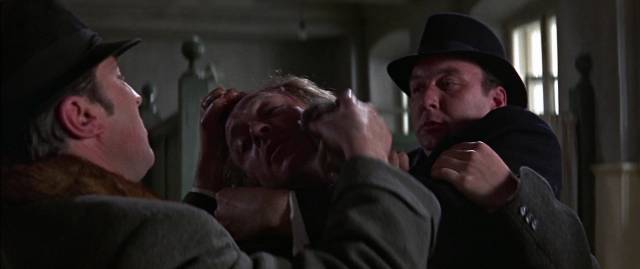
Billion Dollar Brain (Ken Russell, 1967)
The best of the anti-Bond movies in the mid-1960s were Martin Ritt’s The Spy Who Came in from the Cold (1965), adapted from John Le Carre’s novel, and Sidney Furie’s The IPCRESS File (also 1965), based on a novel by Len Deighton, both released between Goldfinger and Thunderball. Both films countered Bond’s upper class suaveness with a rumpled cynicism, with IPCRESS going even further by having Harry Palmer (Michael Caine) expressing working class contempt for the establishment that employs him. Ironically, this and two sequels were produced by the same company as, and shared key personnel with, the Bond franchise.
IPCRESS was followed by a more dour film, Funeral in Berlin (1966), directed by Bond regular Guy Hamilton. Given all this background, it seems almost incomprehensible that the third Palmer film was handed to the decidedly idiosyncratic Ken Russell, best known for his rule-breaking television documentaries about artists and composers, who had made just one previous theatrical feature, the melancholy comedy French Dressing (1964). Perhaps producer Harry Saltzman was hoping to shake up the budding franchise – certainly, in plot Billion Dollar Brain (1967) edges towards Bond territory with its globe-trotting narrative and slightly cartoonish “supervillain”. But nothing in Russell’s previous work indicated an affinity for the genre.
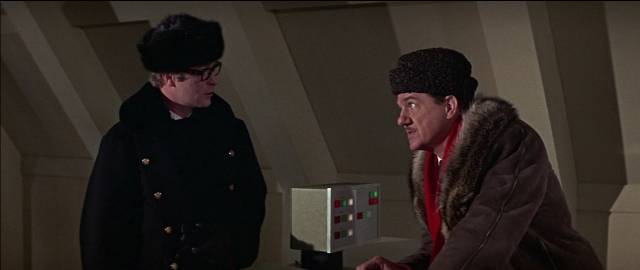
Nevertheless, Russell deftly handled the large-scale requirements of the production, and even proved adept with the big action climax. But between Russell and his scriptwriter, playwright John McGrath (better known for gritty dramas like The Bofors Gun and The Reckoning), the third Harry Palmer movie becomes a broad parody of the genre, mocking the elements which had made the Bond movies a commercial success.
At the start, Palmer is freelancing as a seedy private eye in London. His old boss Colonel Ross (Guy Doleman) pressures him to return to MI6 for a vital mission which involves him delivering a mysterious package to Norway. There he meets an old U.S. intelligence colleague, Leo Newbigen (Karl Malden), and Anya (Francoise Dorleac), a woman of uncertain loyalties. The package turns out to contain deadly germ warfare pathogens stolen from Porton Down, which are being delivered to an underground organization in Latvia which is funded by Texas oilman General Midwinter (Ed Begley).
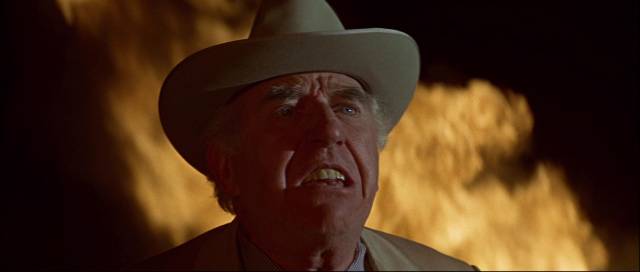
Midwinter has raised a private army which is scheduled to invade Latvia as soon as the underground rises up against the country’s Soviet masters. The problem is that Newbigen has been stringing the General along: there is no mass resistance, just a handful of disaffected peasants. Leo has been pocketing all the funds Midwinter has been supplying to seed the revolution against Communism. With betrayals, double- and triple-crosses, it falls to Harry to head off a dangerous international incident and disaster.
The mixture of cynicism, violence and satire climaxes unexpectedly in a huge action sequence which takes on a dark and depressing tone. Midwinter’s army, hidden inside a fleet of tanker trucks, drives across the ice between Norway and Latvia with Harry racing to stop them in a small car. But he’s too late; the Russian air force bombs the ice so that it can no longer support the trucks – the entire army sinks into the freezing Baltic Sea, a huge pointless waste of life in service of a delusional megalomaniac’s dream of restoring the world to God and Capitalism.
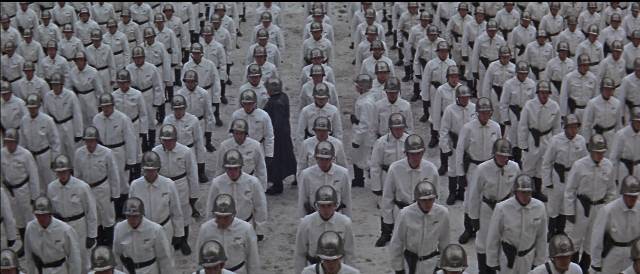
Although Ken Russell did work again on a fairly large scale over the next few decades, Billion Dollar Brain remains something of an anomaly in his career, the single big-budget studio-financed commercial movie in his filmography. It’s notable that he nonetheless managed to infuse it with some of his signature iconoclastic wit.
*
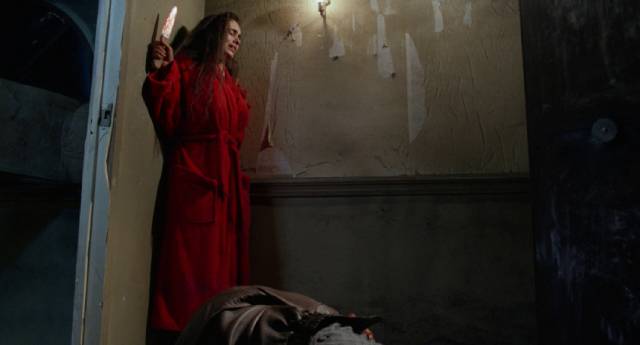
Baby Blood (Alain Robak, 1990)
Yet another movie I had never heard of by a filmmaker I had never heard of. I took a chance based on the seller’s brief description, which made it sound idiosyncratic enough that maybe I’d be seeing something original … although the quote on the front of disk case isn’t exactly inspiring: “A gorehound’s delight” – Fangoria. Baby Blood (1990) is an oddly effective French horror movie, kind of like a grindhouse version of Andrzej Zulawski’s Possession (1981), complete with a climactic appearance by a tentacled monster borne of the heroine.
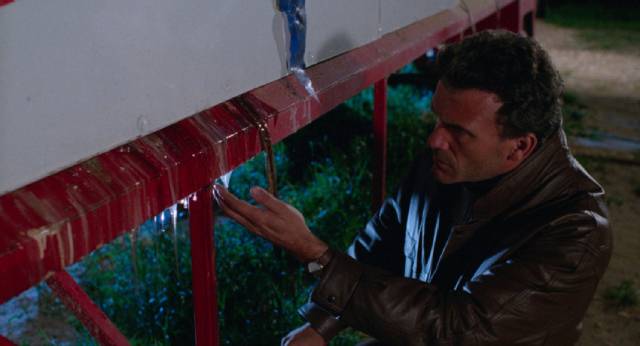
In the prologue, we are told that certain entities came into being with the planet, all but one going on to evolve into the multitude of life forms which populate the Earth. That one has remained in its primal state, waiting for an opportunity to be born. It gets itself inside a big cat in Africa which is trapped and shipped to a circus in France. There, it erupts from the cat and slips into the bed of Yanka (Emmanuelle Escourrou), the young assistant to the lion tamer who is in an abusive relationship with the show’s owner. Taking up residence in her womb, the entity begins to control her behaviour as it gestates, speaking to her and aggressively fighting against her resistance.
She leaves the circus and hides out in a tenement, tormented as the thing inside her forces her to kill and drink blood to help it grow. Used and abused by the entity as she’s used and abused by men – she’s hit, sexually assaulted, not to mention being forced to commit murder – Yanka has no choice but to carry the thing to term (we’ve already seen what it can do when it decides to leave a host – the big cat essentially exploded). When she finally does give birth, it looks like a normal baby, but only briefly, shedding its human skin to reveal a tentacled form which makes its way to the sea in order to begin its corporeal evolution…
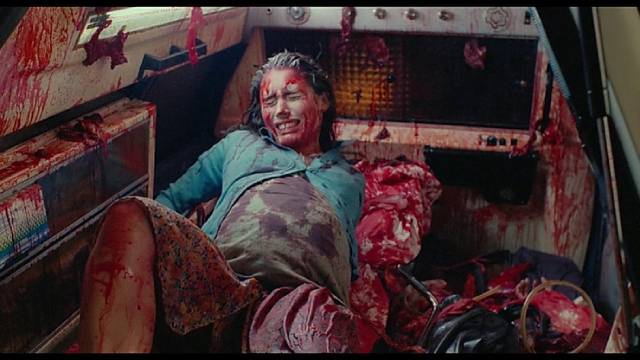
Baby Blood does have its share of graphic gore, not to mention copious amounts of nudity, but its tone remains rather sombre, not unlike Zulawski’s film in its focus on a woman struggling to assert herself against masculine demands. Perhaps its Frenchness helps to make it seem more serious than comparable low-budget American horror movies. Escourrou gives a pretty fearless performance and the creature, though seen only briefly, is effectively done. An interesting oddity, it would make a decent double-bill with Frank Henenlotter’s Basket Case (1982).
The Kino disk has a commentary and an optional English dub.
*
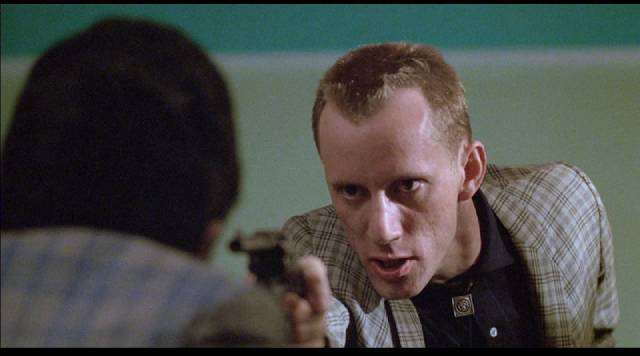
The Onion Field (Harold Becker, 1979)
Harold Becker had made a few documentaries and one feature (The Ragman’s Daughter, 1972, based on an Alan Sillitoe story) before he teamed up with Joseph Wambaugh for this adaptation of the former cop’s non-fiction book about a 1963 murder case. Independently produced and shot largely on the actual locations, the film has the unruly structure of reality rather than a well-constructed fictional narrative. This is both its weakness and its strength, giving the story a rawness even as it eventually becomes frustrating and inconclusive.
On the night of March 9, 1963, a couple of LAPD officers pull over a car which they feel looks suspicious. The car is occupied by a couple of petty thieves, Gregory Powell (James Woods) and Jimmy Lee Smith (Franklyn Seales). Taken by surprise, the officers are driven to a remote area where Powell, who has a misunderstanding of the law, decides to kill them. He believes that “the Lindbergh doctrine” means that they face the death penalty just for the act of kidnapping, so he might as well kill them in hopes of getting away (that rule would actually only come into effect after the use of violence, making the killings even more senseless).
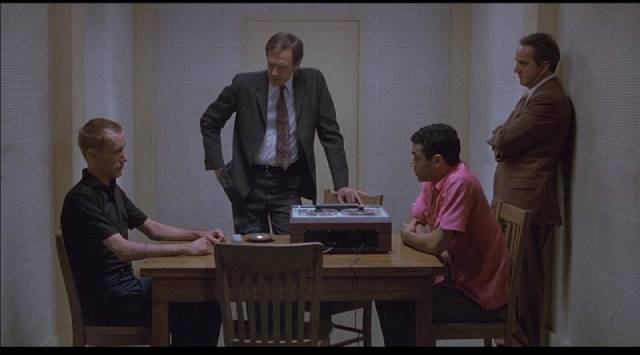
After the harrowing depiction of the crime, which leaves Officer Ian Campbell (Ted Danson in his first big screen role) dead while Officer Karl Hettinger (John Savage) manages to escape into the darkness, the film splits its time between the arrest and a series of trials which drag on for years (the guilty pair are initially sentenced to death, but endless appeals and legal tricks get those sentences commuted) and the psychological deterioration of Hettinger, who is ostracized because he gave up his gun during the initial encounter with the criminals. That Campbell had Powell’s gun pressed into his back was not seen officially as justification for submitting to the criminals and Hettinger was considered responsible by his superiors for Campbell’s death, even though both officers would have died on the street anyway if he’d tried to shoot it out with the criminals.
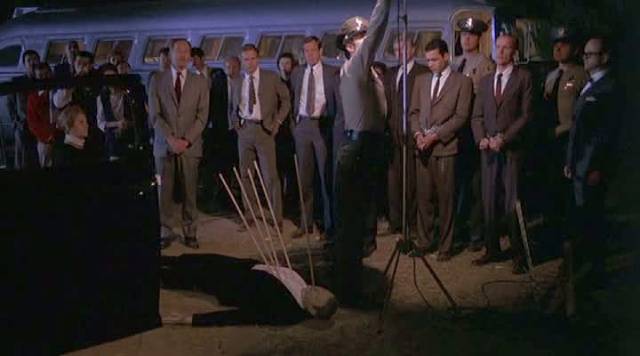
Years pass, Hettinger leaves the force, Powell becomes a jailhouse lawyer helping other prisoners with their appeals … and the brief moment of fear and death eventually gets lost in the rambling aftermath. Life offers none of the tidy satisfactions of a well-wrought story. Which is not to say that the film itself lacks satisfactions. Charles Rosher Jr’s unfussy cinematography adds an air of realism to the material which strongly supports Becker’s intention to document the case without unnecessary embellishments. But most importantly, Becker gets excellent performances from his cast, giving the material even greater authenticity. James Woods is chilling as the sociopathic Powell and Seales is sadly pathetic as Smith, while Savage, this early in his career, gives his best performance as Hettinger, a man virtually destroyed because of a decision made in a moment of extreme stress which everyone around him second guesses and finds unacceptable. Added to the harsh criticism he faces is a deep sense of survivor guilt. What makes this all the more heart-breaking is that while Hettinger is devoured by the fallout from that moment, Powell gains strength and stature – the victim is crushed while the killer is perversely rewarded by a system which eventually forgets his appalling crime.
The disk includes a commentary from Becker, an interview with Savage, and a featurette about the case and the making of the film.
*
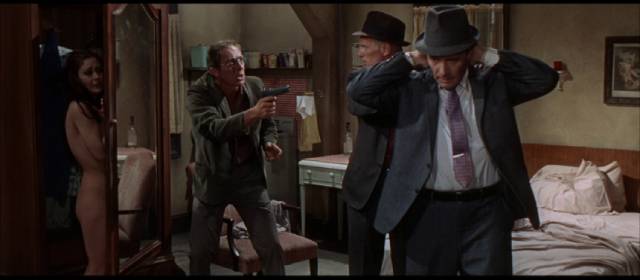
Rocco Bonaro (Harry Guardino) in Don Siegel’s Madigan (1968)
Madigan (Don Siegel, 1968)
After a series of tough and effective B movies in the 1950s, Don Siegel spent most of the ’60s working in television. His made-for-TV remake of Hemingway’s The Killers (1964) was considered too violent and disturbing for home viewing and ended up being released theatrically, setting the tone for much of what would follow. But his resurfacing as a big-screen director came in 1968 with a mainstream production, well-financed by Universal, and populated with an impressive cast of established stars and familiar TV supporting players. With a script by former blacklistee Abraham Polonsky and Howard Rodman, based on Richard Dougherty’s novel The Commissioner, Madigan is a mixture of police procedural, bureaucratic politics and soap opera shot on location in New York for some added authenticity.
Madigan (Richard Widmark) sets the template for Siegel’s subsequent cops bucking the system – Clint Eastwood in Coogan’s Bluff (also 1968) and Dirty Harry (1971). But Widmark came from an earlier age and his character is more ambivalent than Eastwood’s; the tension between maverick and bureaucracy is less one-sided in Madigan. The Commissioner, played by Henry Fonda, is as concerned with police legitimacy as he is with departmental politics – a wild card like Madigan who breaks the rules is a threat to public trust in the force. It doesn’t help that Madigan’s reckless behaviour ends up getting people hurt … and dead.
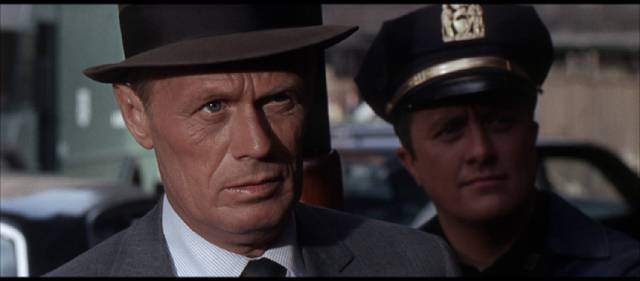
The narrative is set in motion when Madigan’s bad judgment results in killer Barney Benesh (Steve Ihnat) escaping with Madigan’s own gun (and that of his partner Rocco Bonaro [Harry Guardino, who would be Dirty Harry’s irritable commander a few years later]). While the Commissioner juggles the PR disaster and an affair with a married woman (Susan Clark, who would hook up with Coogan right after this), Madigan and Bonaro are given just a couple of days to track down Benesh and make things right. Madigan’s violent methods do eventually bring results, but at great cost to himself. In the movies that followed, Eastwood’s cops are left unscathed by their errors, their tough guy methods getting the job done and the bureaucracies exposed as obstacles to dealing with dangerous criminals. Next to the gritty ambiguities of Madigan, Coogan’s Bluff and Dirty Harry are clearly fantasies of power and righteous violence, marking a growing impatience with the messy complications of real life.
The disk has a commentary from film historians Howard S. Berger, Steve Mitchell and Nathaniel Thompson.
*
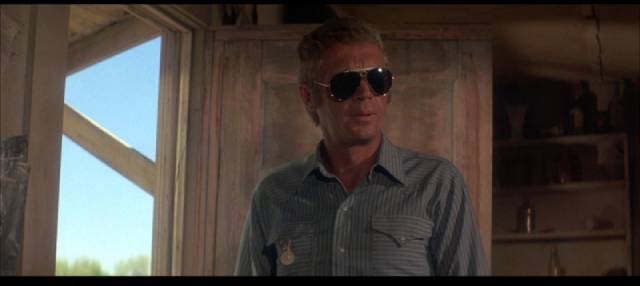
Junior Bonner (Sam Peckinpah, 1972)
Although I’ve now seen all of Sam Peckinpah’s features, each one more than once, some many times, I came to his work in what now seems an unconventional way. I had heard of The Wild Bunch when it was released, but hadn’t had an opportunity to see it – in fact, I didn’t see it until sometime in the ’80s, and then it was on VHS. My first Peckinpah movie was The Ballad of Cable Hogue (1970), his wistful comic elegy to the disappearance of the western frontier. As often happens, the emotional attachment to this first encounter remains strong fifty years later.
The following year I saw Straw Dogs (1971), a film of visceral power which still shocks. Perhaps it was something to do with the contemporary setting and the shift to England, a seemingly alien land for a filmmaker so rooted in the American landscape, but it seemed to me then, and still seems, to be Peckinpah’s most complex and problematic investigation of masculinity. For me, Straw Dogs is his greatest film, one which I have returned to many times despite (or perhaps because of) the discomfort it generates.
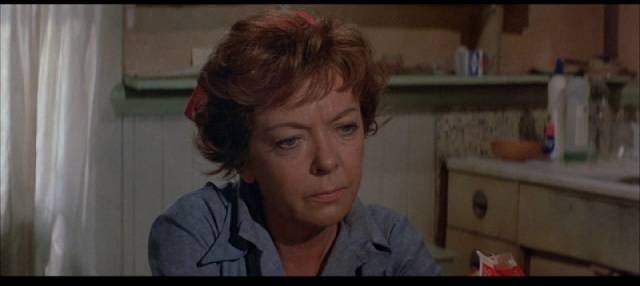
Then the following year, along came Junior Bonner (1972), his warmest, gentlest movie. This three-year run seemed to give the lie to many of the received truths I had heard and read about Peckinpah – the man tied to western myths and given to excesses of graphic violence. Perhaps it was because I began here that I can’t share the adulation heaped on The Wild Bunch – a movie awash with magnificent moments, yet at times gratingly forced; I can’t stand all those scenes of the Bunch drinking and laughing to assert the depth and power of male companionship.
The central theme of The Wild Bunch and Cable Hogue, the vanishing of a world in which masculinity could achieve unfettered expression, through camaraderie and violence, to be replaced by a civilization which suppressed that expression, taming and diminishing men, also runs through Straw Dogs, in which the emasculated intellectual David (Dustin Hoffman) must somehow dredge up his atavistic self to defend his home and woman. It also turns up, slightly displaced, in Junior Bonner.
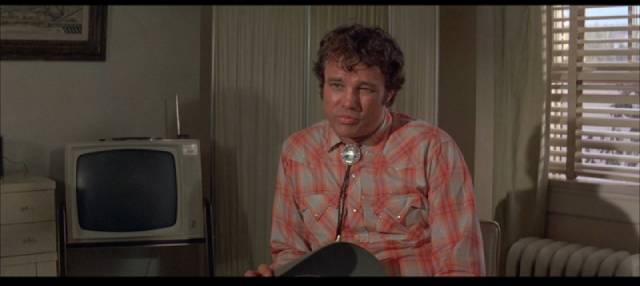
Junior (Steve McQueen) is a cowboy living out of his ideal time. With the frontier gone – and now being buried under suburban development – he lives on the rodeo circuit, drifting from town to town as if trying to outrun the unstoppable tide of “progress”. He’s getting older, his body battered and aching, but he can’t settle down. He constantly needs to prove his own masculinity to himself. And now he’s arriving in his old home town of Prescott, Arizona, for the 4th of July rodeo. There’s a particular bull which has recently thrown him and he’s determined to ride it again for the hometown crowd; his identity is wrapped up in that need to stay on for eight whole seconds, and more importantly to be seen doing it by those who know him.
Driving into town, he discovers the family home abandoned on the edge of a construction site. As he faces off with a huge front-end loader, bulldozers flatten the house, wiping away his past. To make it worse, he soon discovers that all that development is being done by his brother Curly (Joe Don Baker), the town’s most successful businessman.
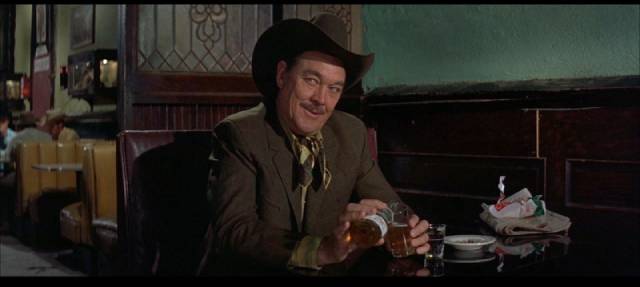
Junior reconnects uneasily with his family – Curly, their father Ace (Robert Preston), and their mother Elvira (Ida Lupino). Ace and Elvira are estranged; she can no longer stand his irresponsibility, blowing all his money on dumb schemes (most recently a failed silver mine) and now eager to head for Australia where there’s gold for the picking – following that elusive dream of a frontier where a man can make something of himself.
The script by Jeb Rosebrook (himself a native of Prescott) effortlessly weaves a meditation on the end of the frontier and its effect on the classic figure of the rugged individualist with a bittersweet meditation on family ties broken by change. There’s a nod to the classic western with a big bar brawl, and the rodeo itself offers visceral action – dynamically shot by Lucien Ballard and edited for maximum impact by Frank Santillo and Robert Wolfe – but this is Peckinpah’s gentlest and most contemplative movie, full of quiet moments between characters who have difficulty expressing themselves to one another. Set in the present day, it’s the most satisfying of his meditations on the end of the West because, rather than in spite, of its reduction of the mythologizing which makes The Wild Bunch and even Cable Hogue so much larger than life. Junior Bonner is scaled to these unexceptional characters and as a result the audience can identify with them, feel a genuine empathy which the films set in the past to some degree keep at a distance.
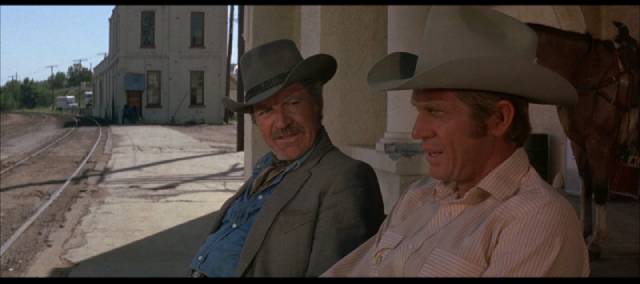
One of the reasons I just revisited Junior Bonner is that a friend recently commented that he thought it didn’t hold up like Peckinpah’s other movies. Seeing it again, I beg to differ. It’s one of his finest films, beautifully directed from a flawless script, and perfectly cast. You get the feeling that this was closer to Peckinpah’s heart than almost any other project and he revealed more of himself in it – it has a warmth not typical of his work, and a kind of wistful sadness which nonetheless doesn’t close the door on hope.
How sad that it died at the box office. Sam only recovered commercially later that year with a return to violent masculinity in The Getaway, a film shot through with a streak of nastiness which may indicate some bitterness that his more personal work had been rejected. This tension between violence and his gentler side runs through most of the movies that followed in the next five years – Pat Garrett & Billy the Kid, Bring Me the Head of Alfredo Garcia, The Killer Elite, Cross of Iron – before he more or less imploded with Convoy and The Osterman Weekend, movies which seem unfinished, incomplete.
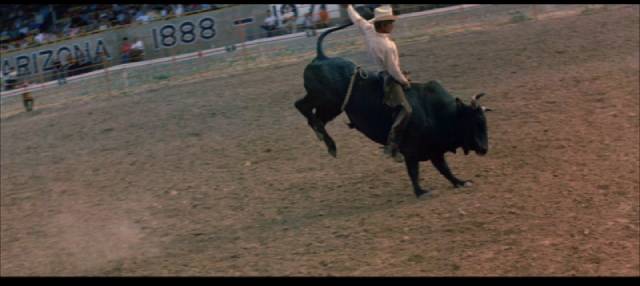
Kino’s Blu-ray, like the Peckinpah disks previously released by Twilight Time, is loaded with extras – a commentary from the usual crew of admirers, Paul Seydor, Garner Simmons, David Weddle and the late Nick Redman; a one-hour doc which forms part of Paul Joyce’s epic documentary study of Peckinpah, Passion & Poetry; an additional half hour of anecdotes about the director from many people who worked with him; plus a couple of brief featurettes with some background on Junior Bonner; and some image galleries and trailers.
*
Still on the KL pile:
Mario Bava: Hercules in the Haunted World, Planet of the Vampires, The Whip and the Body
John Brahm: The Lodger, Hangover Square
Michael Crichton: The Great Train Robbery
Rene Clement: Rider on the Rain
Thorold Dickinson: The Queen of Spades
Alfred Hitchcock: Blackmail, Murder
Philip Kaufman: The Wanderers
Ida Lupino: The Bigamist, The Hitch-Hiker, Never Fear, Not Wanted
Roman Polanski: Bitter Moon
Michael Powell: The Wild Heart/Gone to Earth
Julian Roffman: The Bloody Brood
Robert Thom: Cult of the Damned/Angel, Angel, Down We Go
Michael Winner: The Nightcomers
Comments